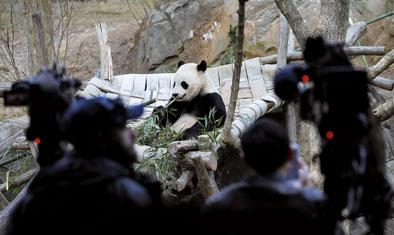
At the National Zoo in Washington, D.C., reporters photograph giant panda "babies" eating bamboo before they board a plane on Feb. 21.
Photo by Xinhua News Agency reporter Yin Bogu
On August 23, 2014, at the National Zoo in Washington, D.C., at the first birthday celebration and "Catch Week", the giant panda "Baby" caught a banner that reads "Many Children and Many Blessings". It was its first birthday.
A staff member burst into tears after a truck carrying a giant panda "baby" left the National Zoo in Washington, D.C., on Feb. 21.
On February 21, a truck carrying a giant panda "baby" left the National Zoo in Washington, D.C., and headed for the airport.
On March 24, the "baby" ended the one-month quarantine life after returning to China, and stayed in his new home in Panpan Garden, Dujiangyan Base, Sichuan Province, to meet with the public.
Photo by Xinhua News Agency reporter Xue Yubin
In the early morning of February 21, 2017, EST, keepers at the National Zoo in Washington, D.C., packed their bags for the last time for their 3-and-a-half-year-old giant panda "baby" in the United States. The truck turned away, and someone covered his face and wept. In the week before that, the zoo held a series of farewell events, and tens of thousands of people rushed to say goodbye to it, causing a serious blockage on the road near the zoo.
As the emissaries of Sino-US cooperation, the giant pandas Tiantian and Meixiang flew to the United States from Chengdu at the end of 2000. On August 23, 2013, Mika gave birth to her daughter Baby, the first female panda to be born at the National Zoo in Washington, D.C. "Baby" has always been a popular star at washington's National Zoo, with a large number of fans.
According to the agreement between China and the United States, the "baby" needs to return to China before the age of 4. Although the "baby" returns to China, its parents "Tim" and "Mei Xiang" and younger brother "Babe" will still live in the National Zoo in Washington, D.C., continuing the "panda love" that the zoo has formed with China since Nixon's visit to China in 1972.